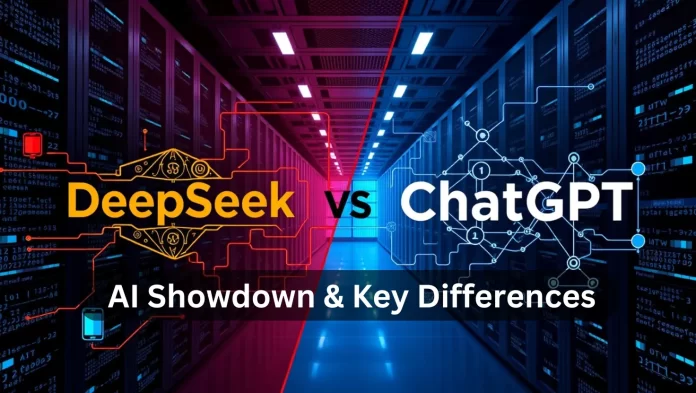As the artificial intelligence (AI) arms race intensifies, a new player has stormed onto the scene, igniting debates on national security, economic stability, and technological dominance. The Chinese AI firm DeepSeek has emerged as a formidable challenger to ChatGPT, the flagship chatbot of U.S.-based OpenAI. While DeepSeek promises open-source innovation at a fraction of the cost, its rise has sent shockwaves through global markets and raised concerns about data privacy, censorship, and geopolitical influence.
This isn’t just a battle of AI models. It’s a battle for control over the future of artificial intelligence itself.
A New AI Disruptor: Who is DeepSeek?
Founded in 2023 by Liang Wenfeng, a former math prodigy and hedge fund manager, DeepSeek AI has upended the AI industry by developing open-source large language models (LLMs). In January 2025, the company launched its first free chatbot app based on the DeepSeek-R1 model—and within weeks, it became the most-downloaded free app on Apple’s iOS Store, surpassing OpenAI’s ChatGPT.
But with success has come scrutiny.
DeepSeek’s rise has triggered a massive sell-off in AI stocks, particularly impacting Nvidia, the leading AI chip manufacturer. Market analysts have likened this disruption to an “AI Sputnik moment”, signaling a potential shift in the global AI power structure.
Yet, beyond the economic turbulence, a deeper question looms: What does DeepSeek’s dominance mean for the future of AI development, data privacy, and political influence?
DeepSeek vs. ChatGPT: What’s the Difference?
At first glance, DeepSeek and ChatGPT appear similar—both are AI-powered chatbots trained on vast datasets to generate human-like responses. But the fundamental differences between the two are stark.
1. Open-Source vs. Proprietary AI
• DeepSeek is fully open-source, allowing developers to modify and deploy its models freely.
• ChatGPT, on the other hand, operates under a freemium model—GPT-3.5 is free, but GPT-4 Turbo requires a €19.19/month subscription.
By democratizing AI development, DeepSeek threatens to undercut OpenAI’s business model, raising questions about the sustainability of high-cost AI infrastructure.
2. Data Privacy: A Growing Concern
• ChatGPT stores some user interactions but allows privacy settings to limit data retention.
• DeepSeek, however, stores user data on servers in China, raising national security concerns in the U.S. and Australia.
Reports indicate that the U.S. military has warned personnel against using DeepSeek, fearing potential surveillance risks. Meanwhile, Australian authorities have urged citizens to exercise caution before downloading the app.
3. Censorship & Information Control
• ChatGPT applies moderation policies aligned with Western content standards.
• DeepSeek has been found to censor politically sensitive topics—particularly those critical of the Chinese government, such as:
• Tiananmen Square protests
• Uyghur human rights violations
• Hong Kong’s pro-democracy movement
When users inquire about these topics, DeepSeek either deflects the conversation or responds with a vague, “Sorry, that’s beyond my current scope.”
For critics, this is a glaring red flag. If DeepSeek gains global traction, will it serve as a tool for state-controlled narratives?
Market Chaos & The AI Stock Shock
The shockwaves from DeepSeek’s rise haven’t just been political—they’ve been financial.
On January 27, 2025, U.S. stock markets tumbled, with the S&P 500 dropping 2% and the Nasdaq Composite plummeting 3.1%. The sell-off was fueled by concerns that DeepSeek’s cost-effective AI model could devalue high-investment AI stocks like Nvidia and Microsoft, which have poured billions into proprietary AI systems.
By January 28, however, markets rebounded, with tech stocks leading the recovery. Nvidia surged 8.8%, and the Nasdaq gained 2%. Investors now anxiously await the Federal Reserve’s policy meeting, along with earnings reports from tech giants like Apple, Microsoft, and Tesla—all of which could shape AI’s financial future.
A Global AI Tug-of-War
DeepSeek’s rapid ascent has positioned China as a formidable AI competitor. But what does this mean for global AI governance?
• The U.S. government is reviewing DeepSeek’s security implications.
• Australian ministers have urged caution over potential data leaks
• Tech analysts warn that DeepSeek could erode Western dominance in AI research.
This isn’t just a corporate rivalry—it’s a geopolitical struggle for AI supremacy.
The Road Ahead: Who Will Win?
As AI evolves at breakneck speed, the ChatGPT vs. DeepSeek showdown is far from over.
If OpenAI and Western tech firms can innovate faster and more securely, they may maintain their lead. But if DeepSeek’s free, open-source model proves sustainable, it could reshape AI economics and global power dynamics.
For now, DeepSeek is disrupting markets, unsettling policymakers, and challenging long-held assumptions about who controls AI.
One thing is certain: This AI battle has only just begun.







